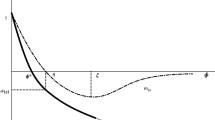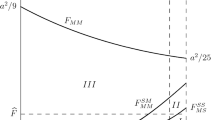Abstract
The basic framework is Hotelling’s model of product choice with quadratic transportation cost. Duopolists choose locations in the initial period and compete in prices in subsequent infinite periods. The firms share profits on the profit possibility frontier. Friedman and Thisse (Rand J Econ 24:631–645, 1993) provides a set of sufficient conditions for a unique equilibrium and minimal product differentiation in this setting. This paper reexamines those conditions. In the presence of some mild continuity requirements, there is exactly one profit sharing rule which satisfies those conditions. Furthermore, given any discount factor(s), the corresponding profits cannot be the outcome of a subgame perfect Nash equilibrium at every pair of locations. This brings out an inconsistency in the conditions. A slight weakening of the conditions, to allow for a wider class of profit sharing rules, can result in multiple equilibria and minimal product differentiation need not obtain. Two examples demonstrate this. Thus, neither those conditions nor their weaker variants can be used to characterize a unique equilibrium.
Similar content being viewed by others
References
Crawford, G.: Endogenous product choice: a progress report. Int J Ind Organ 30, 315–320 (2012)
Dasgupta, P., Maskin, E.: The existence of equilibrium in discontinuous economic games, I: theory. Rev Econ Stud 53, 1–26 (1986a)
Dasgupta, P., Maskin, E.: The existence of equilibrium in discontinuous economic games, II: applications. Rev Econ Stud 53, 27–41 (1986b)
d’Aspremont, C., Gabszewicz, J.J., Thisse, J.-F.: On Hotelling’s stability in competition. Econometrica 47, 1145–1150 (1979)
Friedman, J.W., Thisse, J.-F.: Partial collusion fosters minimum product differentiation. Rand J Econ 24, 631–645 (1993)
Hotelling, H.: Stability in competition. Econ J 39, 41–57 (1929)
Jehiel, P.: Product differentiation and price collusion. Int J Ind Organ 10, 633–641 (1992)
Matsumura, T., Matsushima, N.: Collusion, agglomeration, and heterogeneity of firms. Games Econ Behav 72, 306–313 (2011)
Rath, K.P.: Stationary and nonstationary strategies in Hotelling’s model of spatial competition with repeated pricing decisions. Int J Game Theory 27, 525–537 (1998)
Rath, K.P., Zhao, G.: Nonminimal product differentiation as a bargaining outcome. Games Econ Behav 42, 267–280 (2003)
Rath KP, Zhao G (2020) The nature of equilibria under noncollusive product design and collusive pricing. Mimeo (2020)
Reny, P.J.: Introduction to the symposium on discontinuous games. Econ Theory 61, 423–429 (2016)
Acknowledgements
We are thankful to Thomas A. Gresik and Jeffrey M. Thurk for very helpful comments and suggestions. We are also indebted to an anonymous referee whose thoughtful comments led to many improvements in the paper.
Author information
Authors and Affiliations
Corresponding author
Additional information
Publisher's Note
Springer Nature remains neutral with regard to jurisdictional claims in published maps and institutional affiliations.
Rights and permissions
About this article
Cite this article
Rath, K.P., Zhao, G. On the insufficiency of some conditions for minimal product differentiation. Econ Theory Bull 9, 53–65 (2021). https://doi.org/10.1007/s40505-020-00193-6
Received:
Accepted:
Published:
Issue Date:
DOI: https://doi.org/10.1007/s40505-020-00193-6
Keywords
- Minimal product differentiation
- Profit possibility frontier
- Profit sharing rule
- Subgame perfect Nash equilibrium
- Unique equilibrium




